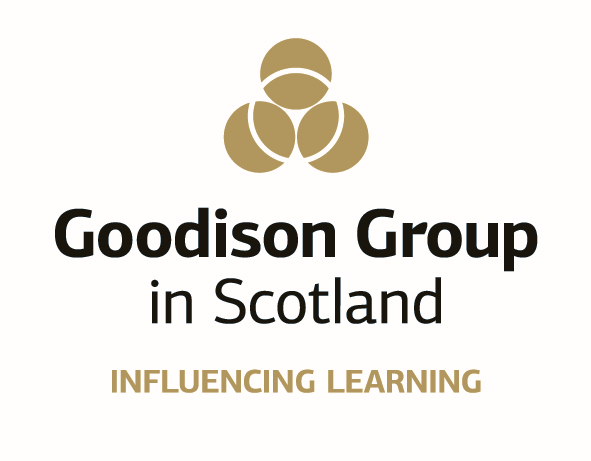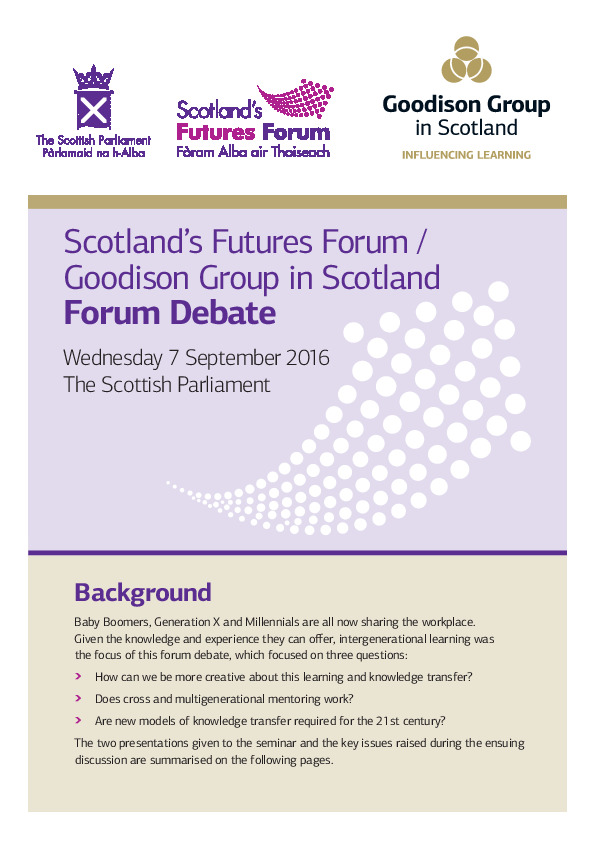Wednesday 7 September 2016, at the Scottish Parliament
Baby Boomers, Generation X and Millennials are all now sharing the workplace.
Given the knowledge and experience they can offer, intergenerational learning was the focus of this forum debate.
Introduction
The debate focused on the following questions:
- How can we be more creative about this learning and knowledge transfer?
- Does cross and multigenerational mentoring work?
- Are new models of knowledge transfer required for the 21st century?
The two presentations given to the seminar and the key issues raised during the ensuing discussion are summarized on the following pages.
Our debate was informed by excellent presentations from Johanna Bakcsy, Masters student, University of Edinburgh Business School and Willie Maltman, Director, Future Proof Learning.
Presentations
Intergenerational learning, by Johanna Bakcsy, Masters student, University of Edinburgh Business School
Johanna opened her presentation by highlighting that multiple academic articles referred to the characteristics and values of the three generational groupings that currently make up 70% of the workplace: Baby Boomers (born 1946 –1963); Generation X (born 1964 –1978); and the Millennials (born 1979 –1999).
While there had been much research into the benefits and challenges of intergenerational working, there had been little written on intergenerational mentoring which was the focus of Johanna’s research. She looked at whether different generations exhibited different professional characteristics and values, alongside the benefits of intergenerational learning through mentoring.
For her research, Johanna interviewed self-selected mentoring pairs, aged between 18 and 70, working in a range of industries, including biotechnology, education, financial services and the public sector, and then followed up the interviews with a more widely available on-line survey.
Participants reported a range of benefits from intergenerational mentoring ranging from help with specific aspects of their career, such as challenging assignments, through to personal benefits, including friendship, having a role model as well as offering a counselling aspect.
Particularly for Millennials, intergenerational mentoring provided development in leadership, while Baby Boomers and Generation X were more likely to report that the mentoring had challenged them to avoid career plateaus. All generational groupings said the learning had been ‘two-way’ and they were more likely to reflect on their own personal growth as a result of the mentoring.
Critical factors for success were the establishment of trust and respect at the outset, a willingness to listen and to be challenged, and an ability to share knowledge and offer new perspectives.
It seemed possible that the individual benefits of intergenerational mentoring might also translate into a range of organisational benefits including: greater creativity and innovation; increased employee satisfaction; higher commitment and lower staff turnover.
Organisations were particularly well placed to raise awareness of the benefits of intergenerational learning and to embrace diversity by addressing stereotypes around age. However, based on her research, Johanna suggested that the culture within an organisation was critical to the success of intergenerational mentoring and that in setting up such mentoring, organisations should encourage such relationships but not force partners together. Similarly, while HR needs to facilitate the mentoring and to assist in any training needs, participants should be left to set their own goals.
Following Johanna’s presentation, the values that had been ascribed to each generational grouping and the generational groupings themselves were questioned. Had they been oversimplified? Were they potentially harmful, creating barriers and generating a sense of ‘othering’ of people, or at the very least distracting artificial constructs?
Within this context, the blogger, Brenda Wong, and her fortnightly blog, ‘Mythical Millennial’ was mentioned.
Johanna agreed that individuals came with different life experiences and may or may not have fitted their generational description. She added that it was also difficult to generalise generations across cultures given that individuals’ locations and social experiences would vary greatly. She also acknowledged that the ‘generational boundaries’ were not determined by precise dates.
However, despite these shortcomings, she suggested that generational membership still offered a convenient proxy for the characteristics witnessed in a cohort of specific individuals while reiterating that her research had found that some Generation Xers exhibited values that were closer to that of Baby Boomers and vice versa.
Willie Maltman, Director, Future Proof Learning
Willie offered a personal perspective of his experience of participating in intergenerational mentoring. Willie’s career spanned banking, HR and IT before he joined and then led a management buy-out of Eglinton Management. More recently he has gone on to set up a new business, Future Proof Learning.
Over the course of his career, Willie has had extensive experience of being both a ‘mentor’ and a ‘mentee’. He has ongoing mentoring relationships with four Baby Boomers and two Generation Xers, and is in the course of setting up a mentoring arrangement with a Millennial. These relationships have been formed with former colleagues and fellow board members as well as with suppliers and clients from different walks of life. Each relationship is unique and has generated different benefits.
Based on his experience, Willie agreed with some aspects of Johanna’s findings while challenging others. His perception is that not all Baby Boomers are as altruistic as the generational groupings would suggest. However, he has found that many Baby Boomers have been very generous in giving younger mentees exposure, responsibility and positions of authority, and yet while they have been very giving of their time, they are not as open to being mentored themselves.
He has found that Generation Xers can be challenging in their tendency to broadcast rather than request help, and that Millennials often flip between wanting help with something very specific to looking for more general help with their career.
In his experience, Millennials and Generation Xers are not as good at defining what they can bring to a mentoring relationship, possibly because they are intimidated by age, status or seniority, although he argued that they often bring more than they realise. Willie’s message to Baby Boomers would be that they should not confuse mentoring with something paternalistic, and that trust and respect are key to a successful relationship.
Intergenerational mentoring can be affirming and a lot of fun, while stimulating one’s own appetite for learning. However, Willie added it is time-consuming and can be a diversion from other important areas of work. In considering intergenerational mentoring, he suggested that people needed to be prepared to be challenged, to be open to taking risks, to be willing to switch between ‘transmitting’ and ‘receiving’, and should never underestimate a mentor or a mentee.
Based on his own experience, Willie strongly encouraged others to take up intergenerational mentoring opportunities.
Discussion
To stimulate discussion, members were asked to think about their own experiences of mentoring, particularly whether they had been intergenerational and what had been learned from these relationships.
In any kind of mentoring arrangement there is a power relationship, which may be implicit or explicit, and it was suggested that this could be exacerbated with intergenerational mentoring. ‘Mentor’ sets up connotations of a hierarchy,
with the suggestion that the learning is one-way and only one person has something to gain from the relationship. With intergenerational learning, the assumption is often that the mentor is older with knowledge and experience to impart while the young mentee has nothing to offer in return, although it was recognised that mentoring relationships often come about because of the expertise and position a particular person holds in an organisation, rather than because of their age per se.
However, one member highlighted that what she had learned from younger co-workers was different ways of working and a different attitude towards work rather than knowledge. In addition, it was suggested that intergenerational mentoring has the potential to lend itself to a more productive and less competitive relationship than one set up between peers.
Where the benefits from intergenerational learning are one-directional, it was felt that whoever benefitted should be prepared to ‘pay that forward’ in the future.
Representatives from the organisation, ‘Generations Working Together’, which promotes intergenerational approaches and learning in communities for the benefit all generations, shared their experiences, highlighting that it is helpful to work through pre-conceived ideas at the outset, given that there are often moral and psychological differences between different generations.
Their experience has been that once people understand their own mindset and the stereotypes they hold, they are more likely to benefit from the opportunities that intergenerational learning can bring. Within this context the research programme, Common Cause, was mentioned, which explores how human values can be strengthened and given a voice to create responses to a wide range of social challenges.
Colleagues from ‘Generations Working Together’ also highlighted that while bringing people from different generations together has many benefits, the benefits are enhanced if intergenerational learning is undertaken intentionally. The suggestion was that we should consider not only how we can create more intergenerational learning but how we can make it more intentional.
While it is important to establish at the outset, the ethical structure of any mentoring relationship, it was suggested it was particularly important to do so when setting up intergenerational mentoring, to ensure trust is placed at the centre of the relationship and to create a safe environment.
Similarly, both parties need to understand what they are prepared to put in to the relationship and what they expect to get out it.
There was general agreement that significant benefits can be gained from intergenerational learning at an individual, organisational and societal level. It was suggested that boards could benefit from greater intergenerational representation and that the introduction of the Apprenticeship Levy offered the opportunity for organisations and employers to think more creatively about how the fund might be used to engage with young people.
Intergenerational learning also has the potential to be used to reach young people in deprived communities where their experiences of adult relationships might be negative or destructive. This is particularly important given the evidence that the role models for most young people are not celebrities, but individuals who are familiar to them, often members of their own family or someone in their community.
Although intergenerational learning could be used to tackle social isolation, it was suggested that in our digital age, technology may be diminishing such opportunities with the younger generation more likely to turn to the internet for their learning.
Within this discussion, it was acknowledged that intergenerational learning does not necessarily have to take place within a formally established relationship, but often occurs in an unstructured fashion, with for example, grandparents taking their grandchild to a museum.
Reference was then made to a talk on stewardship and education given by Prof Bart McGettrick at Falkland Palace a few years ago. Prof McGettrick suggested that education is a deeply human activity – a conversation from generation to generation – and not a remote formal system of involvement in classrooms and in the curriculum.
At the end of the seminar, members were encouraged to reflect on their own experiences of mentoring and to consider how they might benefit from greater intergenerational learning, bearing in mind Prof McGettrick’s words,
‘We need to encourage young people to engage in discussion, for the people of yesterday to learn from those of tomorrow; for people of distant communities to share their insights and wisdom; for those who can make a difference to do so with the common good in mind, and with reverence to the stewardship of our culture and country.’
Partners



